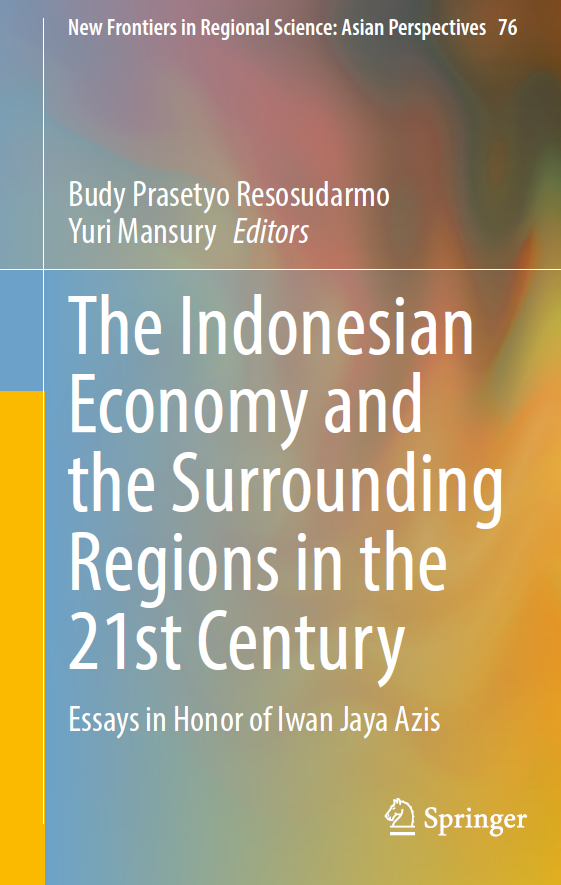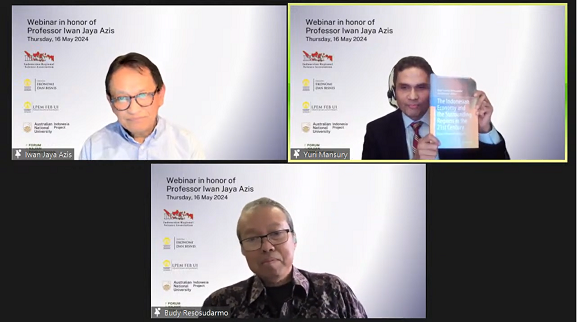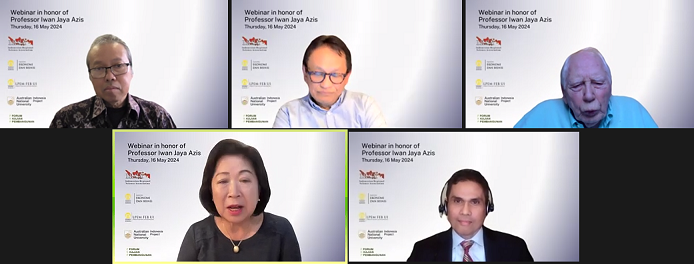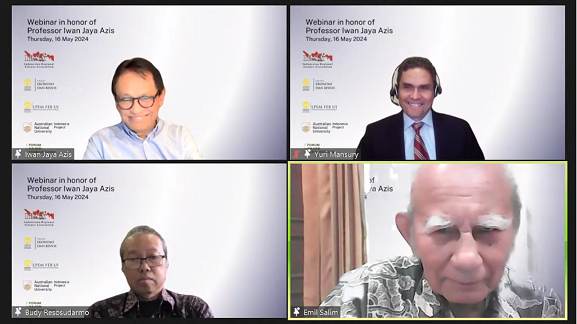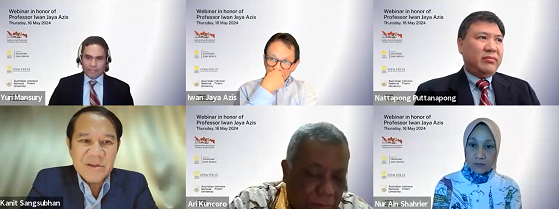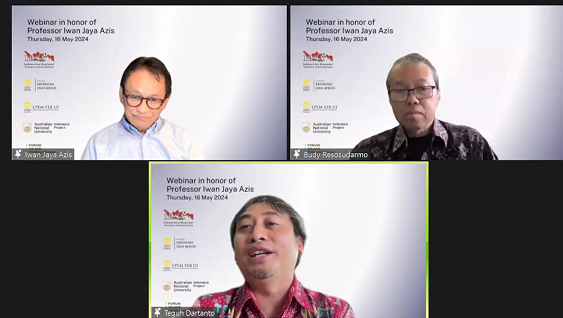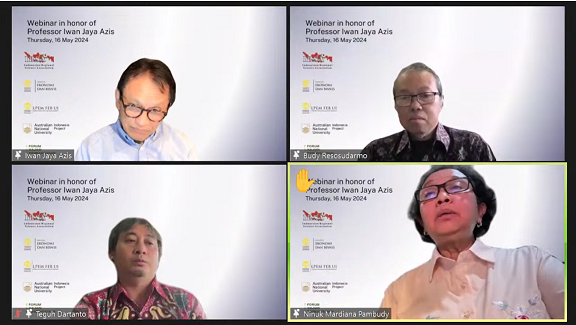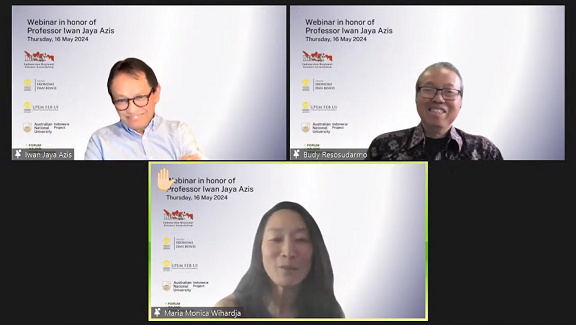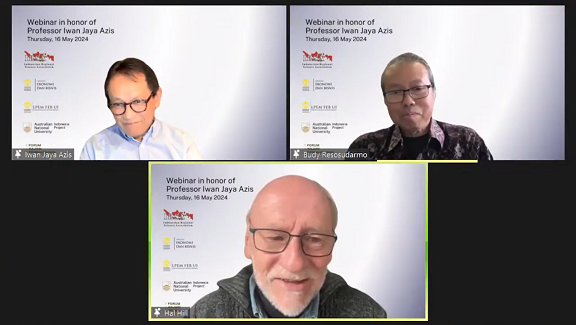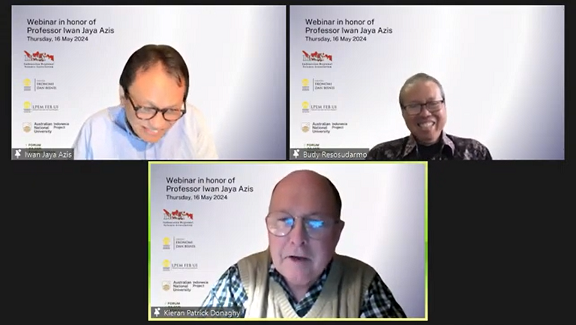In this webinar friends, colleagues, and former students celebrate the remarkable academic journey, profound influences, and invaluable contributions of Professor Iwan Jaya Azis. Additionally, a book dedicated to his legacy was unveiled entitled The Indonesian Economy and the Surrounding Regions in the 21st Century: Essays in Honor of Iwan Jaya Azis.
This event is jointly hosted by the Indonesian Regional Science Association (IRSA), Faculty of Economics and Business, Universitas Indonesia (FEB UI), Lembaga Penyelidikan Ekonomi dan Masyarakat (LPEM) FEB UI, ANU Indonesia Project and Forum Kajian Pembangunan (FKP). More than 300 people from all over the world participate in this webinar, which demonstrates how Professor Azis is well loved and respected by friends, colleagues and former students.
Professor Budy Resosudarmo (The Australian National University) opened the webinar and invited Professor Erik Thorbecke (Cornell University) and Mari Pangestu (Universitas Indonesia) opened the webinar with personal reflections on their relationship with Iwan Jaya Azis, which are part of the collection of essays in the book and can be downloaded from this link.
Three chapters from the book were also presented, chaired by Dr Nur Ain Shahrier (Sunway University Business School and Oxford Centre for Islamic Studies). The presenters and chair were all former students of Iwan Jaya Azis.
- Professor Ari Kuncoro (Universitas Indonesia) presented his paper entitled Small- and Medium-size linkages with large firms: revisiting studies on Indonesian manufacturing. His study highlights fluctuating industrial policies between protectionism and deregulation. Since the enactment of Law No. 27 in 2007, the focus has shifted towards integrating SMEs into broader value chains. The study finds that SMEs have benefited significantly from open trade regimes that allow them to import essential inputs. This policy has narrowed the performance gap between smaller firms and larger ones, particularly in export quality. The increasingly affluent and quality-conscious domestic market has driven non-exporting small firms to rely more on imported inputs. To maintain and enhance SME competitiveness, it is crucial to continue policies ensuring open access to imported inputs. Reducing regulatory burdens and improving infrastructure are vital for effectively integrating SMEs into global value chains. To ensure export quality, industrial input importation is necessary.
- Associate Professor Yuri Mansury (Illinois Institute of Technology) presented his paper entitled I won’t get caught: an agent-based model of corruption with incomplete information. This study shows that corruption emerges from the interaction between detection probabilities and imperfect information available to individuals. Higher probabilities of arrest can reduce corruption, but beyond a certain threshold, they lead to unstable oscillations in corruption rates due to individuals’ inability to accurately predict enforcement actions. Based on this study, Professor Mansury emphasized the need for transparent and verifiable enforcement procedures to stabilize the system and deter corruption effectively. Increased government audits and clear communication about enforcement can significantly reduce corruption by enabling offenders to make accurate cost-benefit analyses. Anti-corruption efforts should focus on transparency and frequent audits to ensure consistent deterrence. Policymakers must anticipate the unintended consequences of high deterrence measures, such as instability in corruption rates, and design policies to mitigate these effects. Clear and predictable enforcement can stabilize corruption dynamics even at higher detection probabilities.
- Associate Professor Nattapong Puttanapong (Thammasat University) and Dr Kanit Sangsubhan (The Eastern Economic Corridor Office of Thailand/EECO) presented their chapter entitled Impact analysis of the Economic Eastern Corridor on the Thai economy: an application of multi-regional input–output model and dynamic computable general equilibrium model. Thailand’s Eastern Economic Corridor or EEC, was create to drive growth through 12 new S-curve sectors, continues and adds to the Thailand Eastern Seaboard development project initiated in 1983. Their study reveals that EEC investments significantly boost GDP, with substantial spatial spillovers benefiting both EEC provinces and other regions. Dynamic CGE simulations show that EEC infrastructure investments can offset negative impacts from events like the COVID-19 pandemic, leading to higher growth trajectories. The largest cross-regional impacts are in service sectors such as trade, communication, and finance. Based on these findings, the authors conclude that sustained investment in the EEC is essential for maintaining economic growth and promoting industrial diversification. Policymakers should use integrated approaches that combine spatial and dynamic economic models for more informed regional development planning. Future research should update data sources and include social and environmental impacts to refine economic strategies further.
After a short Q&A session, Budy Resosudarmo and Yuri Mansury formally presented the book to Iwan Jaya Azis on behalf of editors and authors of the book. A brief presentation on the contents of the book ensued.
Professor Emil Salim (Universitas Indonesia) then delivered brief remarks on his impressions of Iwan Jaya Azis. This was followed by remarks by Professor Iwan Jaya Azis, who conveyed his surprise and gratitude for the book and for all who were involved in putting together the book.
Before closing the webinar, attendees were given a chance to give their well wishes in video and written format.
Happy birthday and many happy returns, Pak Iwan!
